what happened to the kid who played the banjo in deliverance
Deliverance wouldn't seem like a film that begs for a re-watch. That's probably because its two virtually iconic moments, a banjo session at a truck stop and a man'south rape in the wood, have been co-opted for numerous hillbilly exploitation moments always since; many of u.s.a. probably associated the roots of mainstream hillbilly parody coming from this flick.
The banjo chords solitary tin exist used as a you're not welcome here audio from afar whenever a stranger enters the wood or played for laughs whenever a urban center slicker enters the rural s. And a redneck man's desire to rape another man has been used in films as varied as Lurid Fiction and Dumb & Dumber ; after 1972, amalgamated flags and bad teeth all became easy story codes to imply danger to another homo that a rape could exist coming.
Deliverance has at present been in the world for 45 years. And it demands a re-watch but not for the reasons you lot might think. Sure, in America, many who are grappling with the current state of the White House have turned the The Hillbilly Elegy into a bestseller through a desire to "get to know" the people in u.s.a. that bleed Republican red. And there's been a backlash against J.D. Vance'southward bootstrap success book considering his descriptions of impoverished learned helplessness certain seems to echo a governmental downwardly-speak to the rural poor. Yes, there's definitely strife betwixt city folks and rural folks in Deliverance, but just similar a purchase and and then dismissal of Vance's book because it doesn't share a similar worldview is a kneejerk oversimplification, the view of Deliverance being mod metropolis men vs. un-evolved rural men is also a gross oversimplification.
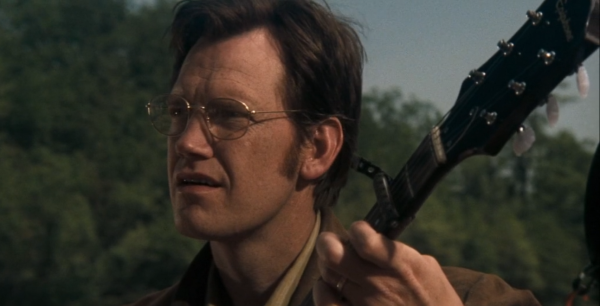
Deliverance is about men who feel weak around other men, regardless of social or regional status, but it's also about the liberty that men accept for granted. And the two scenes that Deliverance is most well known for play out entirely differently than you probably remember.
Before dissecting those two scenes, permit's discuss the four men who come up from the metropolis into Appalachia for a canoe trip. Burt Reynolds is the alpha male who is constantly shown in a state of trying to prove himself, even though all the other men in the group accept already conceded to his machismo superiority; from his leather belong to his fast off-road driving, and his back-to-the-earth passionate description of why they need to traverse this river before a dam gets built turning it into a staid, motionless lake—Reynolds' Lewis is e'er attempting to show that he's in charge. Ned Beatty is the waggish fellow who doesn't flex an attunement to back-to-the-earth survival. No one seems to respect him simply they like having him around to feel superior to and to experience adulated past. Ronny Cox is Drew, someone of refined talents in books and musical instruments, and is described to exist "most the best damn person" you'd always come across. Drew'southward declarations don't come up with gruff language and ultimatums similar Lewis', despite his intelligence grounding the entire group. Whereas Drew doesn't appear to be enamored with Lewis or engaging in whatsoever pissing matches, Jon Voight's Ed is somewhere in between Drew and Lewis. He'southward attracted to Lewis' bravado because he wished he had it himself. Drew and Bobby's existences are plainer and Lewis' appears more than key and manly. Lewis can sense this affection and so those two men ofttimes pair off together, the admired and the admirer as Lewis either tests Ed's resolve or shows him his superior nature by racing through the woods, leaving the other car backside, and Ed holding onto his seat with a scared await on his face.
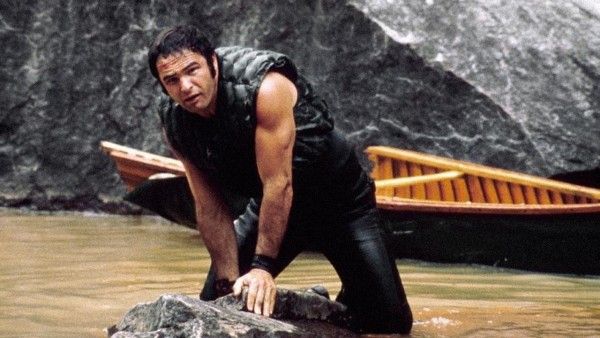
Lewis, the impolite blazon, describes the necessity of their river trip considering "they're building a dam across the Cahulawassee River. They're gonna overflowing a whole valley, Bobby, that's why… Just about the last wild, untamed, unpolluted, un-fucked upwardly river in the South. Don't you sympathise what I'thou proverb?...They're gonna finish the river upwards. In that location ain't gonna be no more than river. There'southward just gonna exist a big, dead lake… Why? To just push a little more power into Atlanta, a little more air-conditioners for your smug niggling suburb, and you know what's gonna happen? Nosotros're gonna rape this whole goddamned landscape. Nosotros're gonna rape it."
It's important that Lewis uses the word "rape" non because information technology foretells Bobby's rape but because it shows how condescending men are in using the linguistic communication of one of the worst things that tin can happen to a person just is predominantly only likely to happen to women; he uses information technology to signify that something beautiful will become tainted. And that blazon of language utilize tin fifty-fifty imply that a victim of rape makes someone worthless to society, i.e. victim shaming, something that 's inherent in the lower percentage reports of rapes vs. the number of men and women who actually are raped. Victims don't want to face accusatory words or have their behavior analyzed down to every infinitesimal particular in order to ascertain whether or not sexual activity was coerced. I tin can feel some of our readers rolling their eyes, simply men freely use that word out of context considering their gender doesn't accept the innate context of what it feels similar to be statistically likely to exist raped and thus adding protection measures to numerous situations in which it would feel foreign for a man to protect himself from unwanted sexual attending.
Reynolds and Cox empathize this, as well. In a 2012 interview with Huffington Postal service, Reynolds kickoff attributes this thought to Cox and so says, "women become this movie much quicker than men. Women too understand. You know, for so many years men throw the word 'rape' around and never thought almost what they were saying. And I retrieve the picture makes men recollect about something that'svery important, that nosotros understand the pain and embarrassment and the modify of people's lives." And though this moving-picture show is 45 years old, the loose utilise of the discussion is all the same normal amongst many men, ranging from our current President to even movie pundits using the word "rape" to describe what it felt like to take DC fans react negatively to his opinions of the DCEU or what George Lucas "did to [your] babyhood". Your eye roll should be reserved for the flippant utilise of this give-and-take to imply victimization on trivial matters.
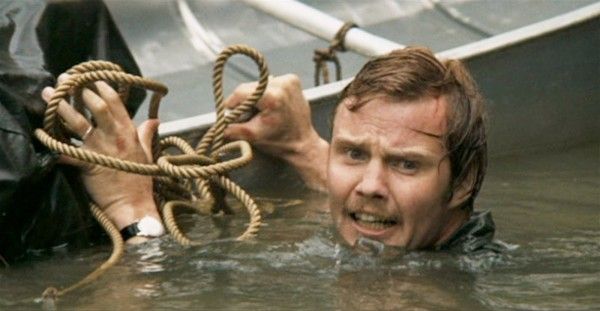
The freedom to use that word without consequences is the same freedom that the 4 men enjoy in going to a remote area to travel downwardly a river, without thought of any potential harms that might befall them other than nature's natural order. The river trip and Lewis' description of it is a perfect vessel for analyzing manhood because the river pushes the men via a "wild and untamed" force. Non but does information technology test the men's resolve simply it enhances their feeling of liberty; much similar men tin wander the streets boozer and alone at night, and though they might be on edge or aware of others who might want to fight or rob them, sexual assault is non on their mind like it would more likely be for a woman in that same scenario.
(To be safety, perhaps this is where I should mention that I myself was sexually abused as a youth, merely even despite living through that I exercise not feel unsafe in many scenarios that a woman would starting time to feel unsafe or at least acutely enlightened of her surround; and though sexual violence is likewise established to be more frequent than our data shows for boys and men, without speaking for anybody, I do recall that near male survivors would say that their gender affords them a privilege in many situations to not feel dangerous.)
Sexual assault beingness the terminal thought of what could go wrong for a human being in a situation is very important for Deliverance. After experiencing the liberty to traverse the last wild river in the South, Ed and Bobby pull their canoes over to a bank for a intermission. This is where they see their tormenters; and for most of their encounter with the hunters, you lot can sense that Ed and Bobby are but worried about existence roughed up and robbed. The principal instigator (played by Bill McKinney) is picking on Bobby in a method that would be very familiar to many men; he'south sized him up every bit being the weaker man in the lot and makes fun of his weight with words and standing very close to him, showing dominance. When he flicks Bobby's clothed nipple he's testing Bobby'southward resolve, how much can he get away with before this guy might stand up his footing? Despite what follows adjacent, yous don't go the sense that this mount man had rape on his mind when seeing these two. It escalated as a power trip.
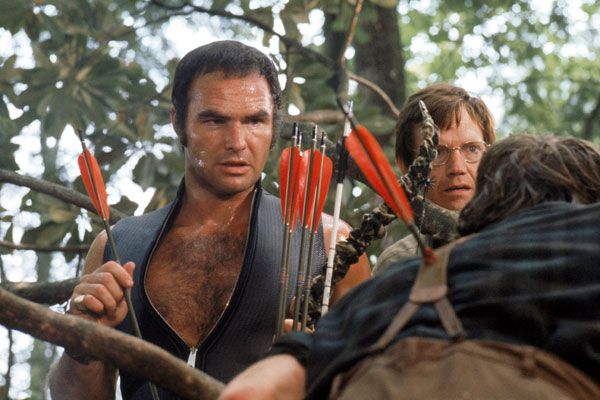
What set off a chain reaction was Bobby insinuating that the hunters were bootleggers. That comment, which was truly Bobby'southward way of standing his ground, is what turns this humiliation game into something personal for the men. Information technology'southward an outdated preconceived notion that those from the city believe that the rural poverty south engages in illegal outlaw activity to make what little money they accept. Past insinuating that they're bootleggers, Bobby has shown that he feels superior to them. And that's when he'southward taken back into the woods past gunpoint, forced to strip, and Ed is tied to a tree forced to watch, every bit it does escalate to rape because Bobby complies with each need thinking that the alternative would exist death.
The four men nosotros spent time with before this moment accept likewise engaged in battles for superiority in moments inside their group but they were able to practise freely every bit friends. During the initial meet with the mountain men, when each faction was trying to establish superiority over the other, the main threat would appear to be violence from their guns or fists. When women deal with a human or a group of men, they take to exist very aware of their words, posture, etc. so as to non stoke this delicate ire of superiority amongst them.
The shocking rape scene in Deliverance has fabricated many men wonder why information technology happens. It's of import to note that in the more than frequent rape scenes of women the motives of the man aren't questioned. We don't disregard it, merely we accept that it happens, and nigh don't need to know extra motivation. John Boorman introduces the rapist the aforementioned way that many films have always introduced a rape scene involving a human and woman: as a stranger who simply emerges, commits a horrific human activity, and and so vanishes. For decades of storytelling, writers and directors felt no need to add motivation to that scenario, it's just accepted that that's a threat. And that'south how Boorman sets up this scene and it'southward ingenious considering it should force men to grapple with why this movie is and then uncomfortable for them but perhaps and then easy to have and non question a rape scene involving a woman. Information technology also essentially plays out the sickening "she was asking for it" argument equivalent with another human being substituted for a woman. Bobby's unproblematic bootlegging comment shifted the whole state of affairs into something where the mountain human felt he needed to show his power and superiority over him. And of course a human in the audition will think that is wrong and tin can hopefully make the leap to all "request for it" defenses are disgustingly incorrect.
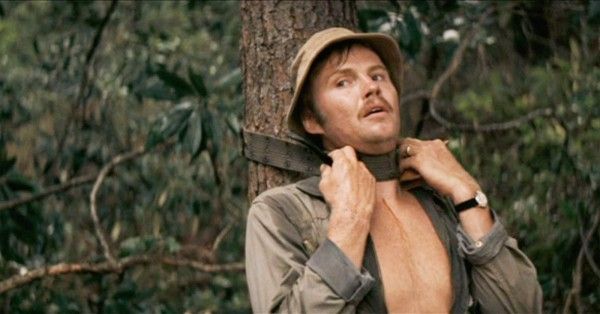
Deliverance should be something that, if they aren't there already, puts men in a victim'due south shoes, simply by being another man, and teaches them that it is the most pejorative thing that a human can practise to some other human. When Lewis shoots the mount man, Deliverance uses that to gear up a thriller aspect of needing to cover upwards that offense due to the distrust of local authorities perhaps being related to the dead. Information technology doesn't say information technology outright—in fact the men of Deliverance don't even mention what happened to Bobby outside of the man needing to be shot for the injury he caused—but going to whatever authorities to written report a rape is going in with the deck stacked against the victim because proving rape is very hard and that's where the questions of how and why the rape occurred, starts twisting the knife of shame and fault in the victim.
Bobby has a witness in Ed for the whole act, and Lewis and Drew witness the very end; but Bobby also doesn't want to go through with publicly albeit that this had happened to him, something that all iv men concur with and information technology'southward perhaps the only mode they put themselves in Bobby'southward place, that they wouldn't want others to know. The death of the mount human being allows for a different survival plot to kicking in, how volition they get back to their trucks without government finding the dead human being and zeroing in on them for murder, but the distrust of local government is key. It's heavily implied that the regional jury would be their undoing due to blood ties, but one can't overstate that watching this 45 years after—with many horrific rapes going unpunished due to juries determining lack of facts or judges even admitting a stance of boys will exist boys—men should read that actress layer of the fault within our judicial system that has shown repeated difficulty to side with, or even acknowledge, the victim.
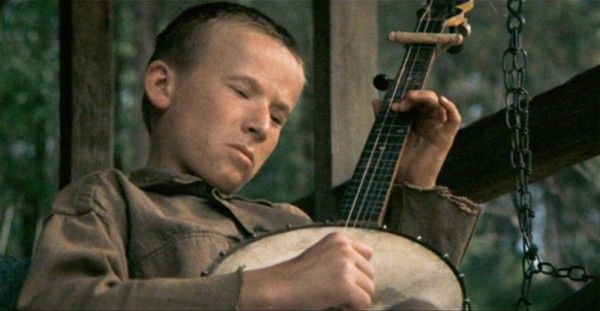
Let'due south backpedal for a moment to the other iconic scene. The banjo scene, it is a unlike side of the coin than the rape scene. Drew begins plucking his guitar at a one-car gas station and a boy with features that imply familial inbreeding begins mimicking his song; the two exercise a call and response and eventually speed up into a rollicking melody. It like shooting fish in a barrel to say that Deliverance feels superior to the rural southward, only I don't think that's the case. The banjo scene has been twisted in pop culture into something that foretells something awful to come, but the scene itself is actually quite delightful and fun. It shows Drew's willingness to appoint with the locals and his immense respect for the child's musicianship.
Because the child rebuffs his handshake, it implies that the city vs. rural game has set motion but the ending of the film is key. After surviving the trip down the river, the men by and large receive kindness from the community. The medical facilities are not archaic, the doctors are every bit as talented as the ones y'all'd discover in the city. The police force are equally discerning, too, those who have dominance in the surface area are non shown as hicks. However in a flip of the rape narrative, it'd be impossible for the police to show anything that they accept a hunch on, without finding the evidence of a body. With the river near to be dammed and flooding the rest of the valley, that body is likely never to be found, so the men are just told to never always come back to this place.
This tug of war betwixt the rural surface area and the men from out of boondocks is emphasized past the city substantially wiping this town off the map. The dam is being congenital to send more ability to the city of Atlanta. The boondocks where the men receive aid and need to deceive their fashion out of in order to go back to Atlanta needs to move everything to a higher ground. Simply don't forget the word that Lewis, the supreme male specimen of the grouping, uses to describe this process. He describes information technology every bit "rape." And Deliverance is nigh everything that that discussion implies, except it shows information technology equally a physical human action instead of a brassy loose discussion; it'south the ability that the urban center has over rural areas, physically removing them, it'southward the ability of pre-conceived notions that overrides juries and it is, of grade, the overpowering nature of rape itself. Equally Reynolds said, "women get this movie quicker than men" and 45 years after at present is the all-time time for men to re-spotter it and get aware of their privilege to venture anywhere they please.
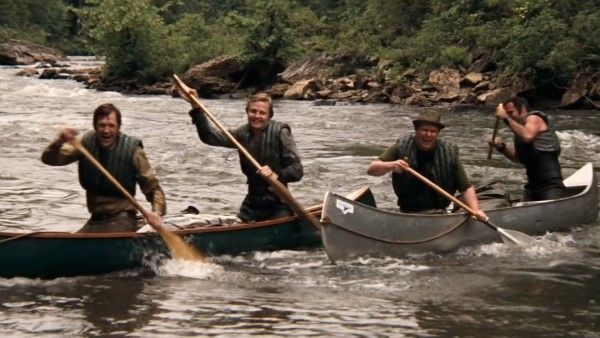
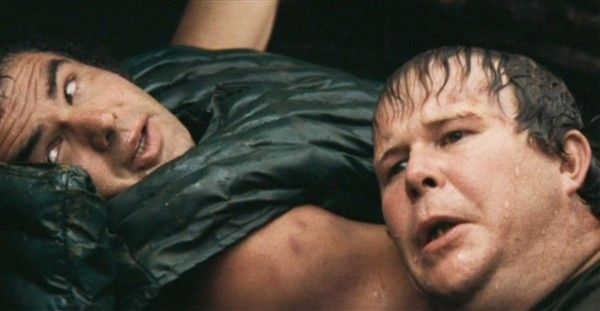
Almost The Writer
Source: https://collider.com/deliverance-rape-scene-explained/
0 Response to "what happened to the kid who played the banjo in deliverance"
Post a Comment